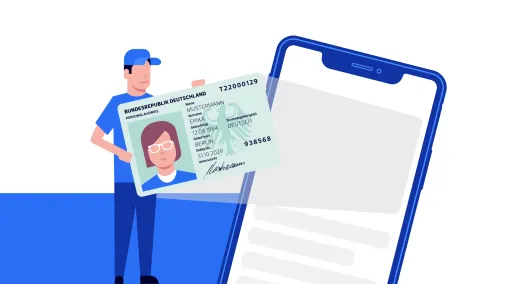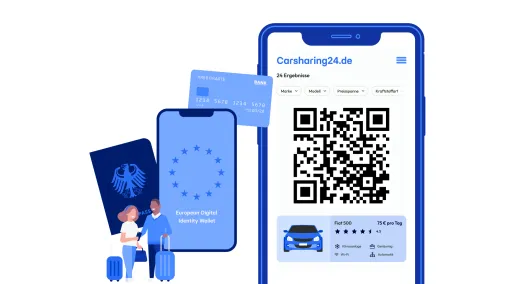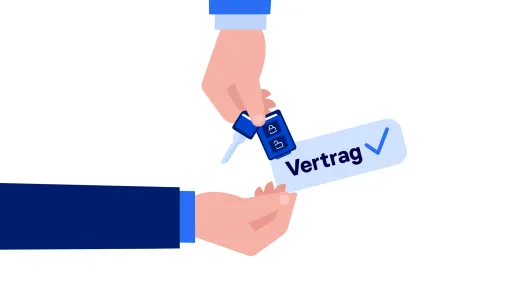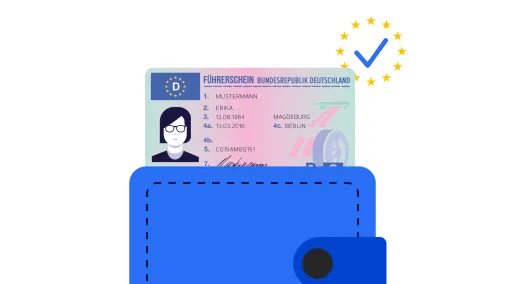
The EUDI Wallet
Secure digital identification across Europe
updated on 5 December 2025
Many people are already using smartphone wallets to store boarding passes, bank cards, or event tickets. With the EUDI Wallet, the EU is now developing its own version of a digital wallet. But what makes this wallet different? And what advantages does it offer for proving a digital identity?
What is the EUDI Wallet?
The abbreviation stands for EU Digital Identity Wallet. At its core, it is a smartphone app that functions as a digital wallet for identity credentials.
Instead of carrying an ID card, driving licence or certificates on paper, citizens will in future be able to store these credentials securely in digital format. This creates a universal identity solution recognised across the EU – comparable to a banking-app wallet, but designed for official documents and more.
What role does the eID play?
The European EUDI Wallet builds on national digital identities, such as the eID in Germany, the online ID function of the national ID card, which is already recognised today and meets the highest eIDAS level of assurance.
With eIDAS 2.0, this technology is being scaled across Europe: national eIDs form the foundation; the EUDI Wallet expands them into an interoperable system. The outcome:
- A strong foundation of trust through high security standards
- A seamless transition for citizens already familiar with the eID
- Greater efficiency for businesses and public authorities that can build on an established system
The eID provides the basis; the EUDI Wallet turns it into a cross-border tool for digital identity.
Why do we need a digital identity in Europe?
The digital world has no borders, but using identity credentials across borders can still be difficult. Anyone who wants to identify themselves online with a bank, with public authorities or in another EU country quickly encounters barriers. The result: different procedures, complex authentication processes and limited user-friendliness.
The EUDI Wallet aims to change this by creating a unified European solution that makes many everyday tasks easier, such as:
- Opening an account or signing contracts – without paperwork
- Making border crossings and travel easier
- Sharing medical documents (e.g. when redeeming e-prescriptions) or certificates securely
How does the EUDI Wallet work in practice?
At its core is a smartphone app where users store their digital credentials – from ID cards and driving licences to educational certificates.
Authentication is carried out securely and simply, using specially secured access controls. This way, citizens retain control at all times over which information they choose to share.
Example
When checking into a hotel, it is enough to share only the relevant data from the wallet: your name and date of birth, but not your full address. This saves time and protects sensitive information.
How does car rental work with the EUDI Wallet?
What benefits are the benefits of the EUDI Wallet?
The wallet offers several layers of added value:
- Data sovereignty: citizens decide which attributes they share
- Security: end-to-end encryption in line with EU standards
- Efficiency: digital identification in seconds, less bureaucracy
- EU-wide use: a uniform solution in all Member States
How is data protection ensured?
The EUDI Wallet follows the principle of data sovereignty: citizens retain full control over their information. They decide which data they share, with whom and to what extent.
This is implemented technically through privacy by design:
- Only the necessary attributes (e.g. age rather than full birth details are shared).
- All data transfers are end-to-end encrypted.
- Attributes are stored in the wallet on the smartphone; there is no central database that could be attacked or misused.
In this way, the wallet combines the highest security standards with maximum transparency. The aim is to build trust and ensure uniform protection of privacy across Europe.
What opportunities and challenges does the EUDI Wallet present?
The advantages include:
- Digitalisation of public administration and the private sector
- Strengthening the European single market
- Greater trust in digital services
But there are also challenges:
- Building acceptance among citizens
- Addressing data protection concerns
- Establishing consistent technical standards across Europe
Political and legal framework: eIDAS 2.0
The EUDI Wallet is based on the revised eIDAS Regulation (eIDAS 2.0), adopted in 2024. It requires all EU Member States to introduce a digital wallet by 2026 at the latest. The goal is ambitious: by 2030, 80 percent of citizens in the EU should be able to use their digital identity via the wallet.
The revision was necessary because, under the original eIDAS Regulation, only a few countries had introduced their own notified eID. Under the new rules, the wallet becomes a mandatory solution across Europe. Each EU Member State can choose how to implement the wallet; it can be provided by the state or by a private provider.
The EUDI Wallet and the digital single market
The wallet is not only a technical project, but also a building block of the European digital single market. It strengthens trust in digital transactions by enabling citizens to manage their identity data and attributes autonomously, transparently and securely, both online and offline.
This will make it possible to present documents such as educational qualifications or driving licences anywhere in Europe and to use digital services across borders. It strengthens the European trust framework and supports the economy.
Integration into existing systems
For the wallet to work across borders, common standards and interoperability are essential. Member States must recognise each other’s systems.
This principle has already been tested in Germany: The online ID function meets the highest level of assurance under eIDAS 2.0 and is therefore recognised across the EU as secure authentication.
In addition, the Qualified Electronic Attestation of Attributes (QEAA) is being introduced. This allows digital credentials, including university degrees and professional qualifications, to be used reliably across Europe. Responsibility lies with qualified trust service providers (qTSPs) listed on national trusted lists, which are, in turn, combined into a European Trusted List.
Technical foundations of the EUDI Wallet
- EU-ARF (Architecture and Reference Framework) as the architectural blueprint. These are specifications for the infrastructure of the national wallets, published by an expert group of the EU, and the Member States.
- Open consultation process with public authorities, academia, industry and civil society.
- Transparency via openCode: development steps are public, allowing feedback.
- Decision in favour of the variant with a hardware security anchor in the cloud and signed data (October 2024).
Where does Germany stand in implementing the EUDI Wallet?
Germany is among the drivers behind the wallet. Bundesdruckerei and its subsidiary D-Trust are developing the necessary technologies and security architectures for a wide range of e-governance solutions.
Pilot projects are already under way, including the integration of the online ID function. The aim is for German solutions to fit seamlessly into the European infrastructure and for citizens to gain practical experience at an early stage.
Looking ahead
The EUDI Wallet is more than a technical project. It is a symbol of a digital and sovereign Europe.
Soon, starting a semester abroad, receiving medical treatment or taking up a new job in another EU country could all be possible without any paper documents. A smartphone alone will be enough to share the necessary credentials securely and purposefully.
Frequently asked questions about the EUDI Wallet
All EU Member States must provide a wallet solution by the end of 2026. From 2030, around 80 percent of EU citizens are expected to be able to use the wallet.
The original 2014 eIDAS did require national eIDs, but only a few countries actually implemented them. With eIDAS 2.0, the wallet becomes mandatory for all Member States.
The wallet strengthens the European trust framework: secure digital identities promote cross-border transactions and help drive the economy in the single market.
For the wallet to function across Europe, Member States must recognise each other’s identity systems. Germany already has a solid foundation with the online ID function (high level of assurance).
In addition to core identity data (e.g. name, date of birth), attributes such as educational qualifications, professional credentials or driving licences can be stored and used across Europe.
The Qualified Electronic Attestation of Attributes (QEAA) ensures that credentials such as certificates or licences are recognised across Europe. They are issued by qualified trust service providers (QTSPs) and are listed in national and European trusted lists.
Yes. In addition to the government wallet, private providers may also develop their own wallets, provided they comply with European standards. This gives citizens freedom of choice and encourages innovation.







